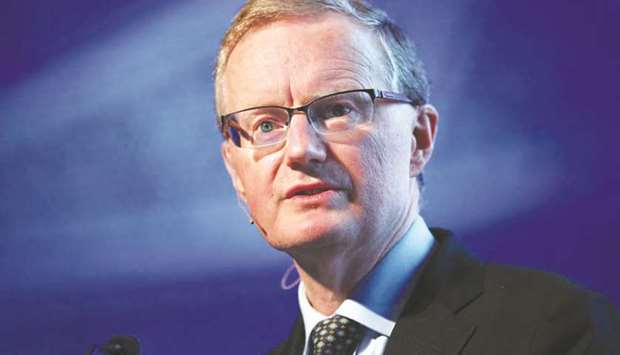Australia’s central bank warned of risks to growth yesterday but wrongfooted rate bears by steering clear from an explicit easing signal, even as data showed shoppers slashed spending during Christmas in another sign of cooling economic momentum.
The Reserve Bank of Australia (RBA) left rates at a record low 1.50% for a 30th straight month, saying accommodative policy was supporting the economy and that further progress was expected in reducing unemployment and lifting inflation over time.
The local dollar jumped as the statement sounded less dovish than the markets had wagered on.
“The main message from the RBA today was that they are still positive on the growth outlook, and particularly on the labour market, and they see the economy as still on track towards lifting inflation back to their target,” said HSBC Australia’s chief economist Paul Bloxham.
Yet, interest rates futures continued to price in a 50-50 chance of a rate cut by the end of the year, reflecting the deteriorating growth momentum in the face of rising global and domestic risks.
Lowe expects Australia’s A$1.8tn economy ($1.3tn) to expand at an above-trend rate of around 3% this year.
That is a slightly more cautious view compared to “a little above 3%” in its previous statement.
The RBA chief did say a pick-up in inflation would take longer than earlier expected, but stuck to his earlier prediction for the unemployment rate to fall to 4.75% over the next couple of years.
“If a central bank is forecasting above trend growth, then it is highly unlikely to adopt an easing bias,” said Westpac chief economist Bill Evans.
“Indeed the chances are still likely that the governor will persist with his assessment that even though rates are likely to remain steady for some time, the next move is likely to be up.”
Despite his sanguine glass half-full view, Lowe did caution about “downside risks” to growth both globally and at home.
“The main domestic uncertainty remains around the outlook for household spending and the effect of falling housing prices in some cities.”
All the same, Lowe stopped short of giving an explicitly dovish signal, even after the US Federal Reserve last week all but abandoned plans for further rate hikes, citing slowing global growth as one of the reasons.
The governor also refrained from committing to the direction of the next move in policy, but investors will get further clues about his thinking at a speech today, followed by the central bank’s quarterly outlook two days later. “We expect he may choose to remind everyone that the cash rate is already at a record low, that it is delivering considerable stimulus to the economy and that further cuts might not achieve much,” HSBC’s Bloxham, a former RBA economist, said foreshadowing Lowe’s speech.
Household spending and the effect of falling property prices were the key uncertainties for the economy, Lowe said, a cautionary note underscored by official data earlier in the day showing retail sales fell 0.4% in December for the worst monthly outcome in a year.
That compared with expectations for a 0.1% decline and an upwardly revised 0.5% gain in November thanks to by Black Friday promotions.
The dismal reading capped a lousy quarter of disappointing data in yet another blow for the country’s economic outlook and had initially sent the local dollar below crucial chart support of $0.7200.
The Aussie, however, got a much-needed boost after the RBA’s statement and was last at $0.7261.
Sarah Hunter, economist at BIS Oxford Economics, said Tuesday’s miss added to downside risks for December quarter economic growth given household spending accounts for around 57% of gross domestic product (GDP).
“We expect momentum in household spending to remain subdued this year, with wages growth not expected to accelerate until 2020, and this will pull GDP growth down to around 2.5% this year and next,” Hunter added.
Australia’s economy expanded a slower-than-expected 2.8% in the third-quarter with private consumption one of the biggest drags.
December-quarter data is due early March.
With global growth slowing and a year-long downturn in domestic house prices pointing to a further loss in economic momentum, calls from some analysts for the RBA to ease policy has intensified recently.
But Lowe showed few signs it would budge just yet.
“The low level of interest rates is continuing to support the Australian economy,” Lowe repeated.
“Taking account of the available information, the Board judged that holding the stance of monetary policy unchanged at this meeting would be consistent with sustainable growth in the economy and achieving the inflation target over time.”
Lowe: Refraining from committing to the direction of the next move in policy.

RBA stays calm as shoppers go missing, global risks rise
